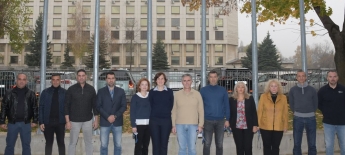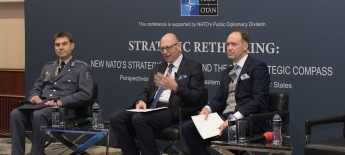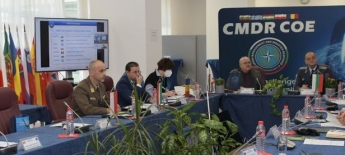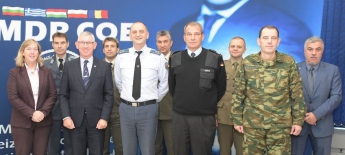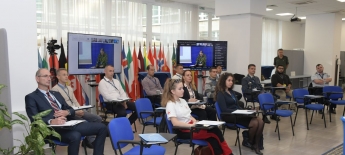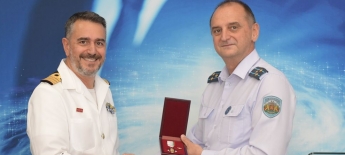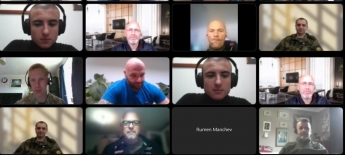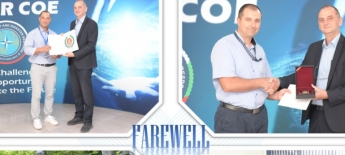Looking Back on the Very Beginning
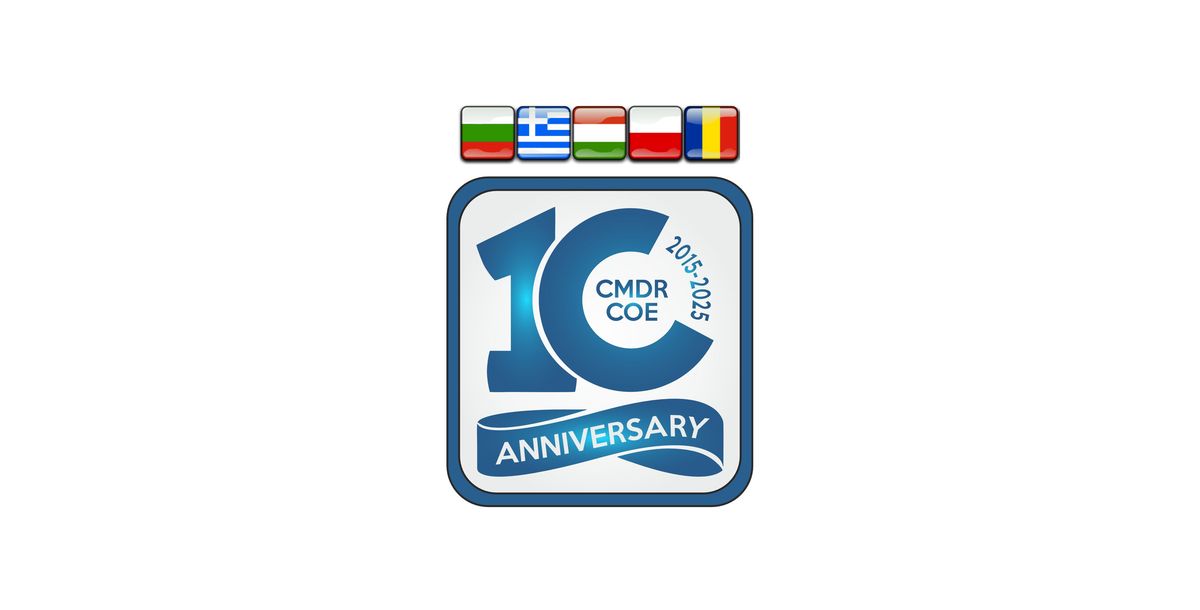
Date: (31-03-2025)
NATO's Centres of Excellence are international military organisations that are designed to provide education and training, assistance in doctrine development, lessons learned, and to support NATO to improve interoperability and defence capabilities, to test and validate concepts through experimentation. The process of development the Alliance centres significantly accelerated with Smart Defence initiative, declared at the NATO summit in Chicago, May 2012. The main objective of this approach was development of specialised expert entities in NATO that support the Alliance transformation with avoiding duplication of nations’ existing efforts, means, resources and capabilities.
NATO’s Centres of Excellence are international military organisations that are designed to provide education and training, assistance in doctrine development, lessons learned, and to support NATO to improve interoperability and defence capabilities, to test and validate concepts through experimentation. The process of development the Alliance centres significantly accelerated with Smart Defence initiative, declared at the NATO summit in Chicago, May 2012. The main objective of this approach was development of specialised expert entities in NATO that support the Alliance transformation with avoiding duplication of nations’ existing efforts, means, resources and capabilities.
In 2011, the Bulgarian Ministry of Defence initiated a project of development an expert entity, designed to assist national institutions and to provide specialised expertise for NATO nations in area of crisis management and disasters response. The project started with the establishing of a working group for development a Centre for high level of competences. The group was tasked to define an appropriate functional area and name of the Centre, to develop drafts of vision, plan and financial assessment of the project, and later on to develop a draft Concept of the Centre. The name of “Crisis Management and Disaster Relief” was contrived at that time. At the end of the 2011, the internal process of coordination was finished and the draft strategic documents for further establishing of the Centre was developed and deconflicted institutionally by Colonel Prof. Mitko Stoykov. The project was used to promote the Bulgarian MOD initiative at all possible levels of NATO, like Concept Development and Education, and Transformation Conferences, international visits and conversations. The process of deconflicting with other similar NATO entities was time consuming, prolonged up to six month.
On March 22, 2012, in accordance with the established NATO procedures for the construction of the centres, a team for the implementation of the project was established by order of the Bulgarian Minister of Defence. Taking into account the opinions of NATO Headquarters, the Joint Staff, member states and NATO centres, a second version of the Centre’s concept was developed.
The Centre was established as an independent legal entity under Article 60 of the Administration Act and a secondary budget appropriations officer under the Bulgarian Minister of Defence with Decree of the Council of Ministers No. 291/16.11.2012 (published in the State Gazette on 23.11.2012). The First Conference on the Establishment of the Centre was planned and held as results were agreed version of the Centre Concept, considered versions of the Centre’s Operational and Functional Memorandums of Understanding, proposed versions of job descriptions of the participating countries.
The Second Conference was held from March 25-27, 2013 where a support was received by the Hellenic Republic and the Republic of Poland to become the Centre’s Sponsoring countries as well as variants of the Operational and Functional Memoranda of Understanding have been agreed upon and future activities for the construction of the Centre and a time frame for their implementation until its accreditation by NATO have been identified.
NATO Partner countries also expressed increased interest in the implementation of the project (Austria, Sweden, Georgia, Ukraine, N.Macedonia, etc.). In response to questions raised by them in the NATO Military Committee, the Centre was presented at a meeting of the committee in the Euro-Atlantic Partnership Council (EACP) format on May 28, 2013. On May 27, 2013, the project was presented to the Working Group of the EU Military Committee, which requested that Bulgaria, after accreditation, provide the Centre to support the development of EU capabilities. In order to avoid duplication and competition in crisis management and disaster response capabilities between NATO and the EU, a questionnaire on the Centre’s activities in the field of training and preparation was completed and sent at the request of the EU. Contacts with NATO and EU structures continue to identify additional opportunities for cooperation and interaction.
Activities for the construction of the Centre and deadlines for their implementation:
• Continuation of talks with ministries and departments in the country for the accession of their experts to the centre – Ministry of Interior, Ministry of Transport and Communications, Ministry of Justice, Ministry of Regional Development and Public Works, Ministry of Public Works and Public Works, and others.
• National ratification of the Memorandums of Understanding for each of the Centre’s sponsoring countries (Bulgaria, Greece, Poland) – completed at the end of July 2013;
• Preparation and submission of a self-assessment of the Centre for the beginning of its accreditation – completed by the end of June 2013;
• Familiarization of the Allied Command Transformation with the self-assessment and its adoption – by mid- October 2013;
• Organization and holding of a ceremony for the official signing of the Memoranda of Understanding by the sponsoring countries of the Centre – 28.08. 2013;
• Organization and holding of the meeting of the Centre’s Management Board and visit of the NATO accreditation team – 11-12.09. 2013;
• Holding meetings and preparing interdepartmental agreements for filling expert positions by interested ministries and organizations from the country – by the end of October 2013;
• Presentation of a report by the ACT to the NATO Military Committee and a proposal to the NATO North Atlantic Council (NAC) to approve the accreditation of the Centre – by the end of October 2013.
• Decision by the NAC to grant the status of an International Military Organization – November -December 2013
After the Centre’s accreditation is completed, due to the extremely strong interest from the Partners, the preparation and conclusion of Technical Agreements with partner countries wishing to join it will begin.
Nevertheless of all effort and results, including agreement between Bulgaria and ACT, in September 2013, the new MOD leadership withdrew its support for Bulgaria’s unwillingness to build a NATO centre on its territory. A number of administrative tricks and obstacles were used to erase the hard-won achievements. In early 2014, the Ministry of Defence decided to change the status of the Centre, make it part of the Military Academy and lower the level of the expert positions. As a result, most of the appointed personnel with extremely high expertise left the Centre forever. After the change of MOD political leadership the following year, the project to build the CMDR COE was restarted.
News
 Participation to the I/ITSEC 2022
Participation to the I/ITSEC 2022Participation of CMDR COE representatives at I/ITSEC, 28 NOV - 02 DEC 2022.
» read more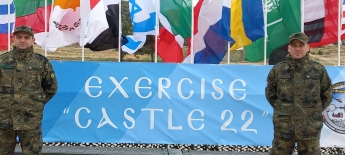 Multinational Exercise “Climate Change Disaster Response Castle-22”
Multinational Exercise “Climate Change Disaster Response Castle-22”Organized by the Hellenic National Defense General Staff (HNDGS) Multinational Exercise CASTLE-22, 28-30 NOV 2022.
» read more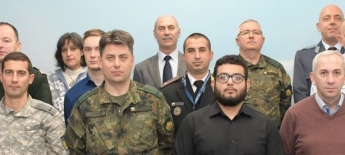 CMDR Exercise Planners Training Course
CMDR Exercise Planners Training Course21-25 November 2022, residential and online iteration
» read more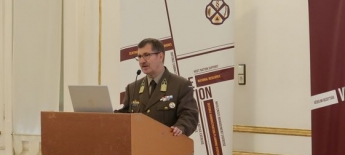 CMDR COE in the Hungarian MOD Annual Disaster Response Conference
CMDR COE in the Hungarian MOD Annual Disaster Response ConferenceAnnual event of the Defence Administration Department
» read more A discussion on resilience and gender perspectives
A discussion on resilience and gender perspectivesNATO IMS GENAD Office-organised Deep Dive session
» read more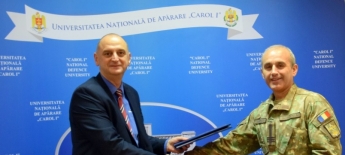 Signed Framework Collaboration Agreement
Signed Framework Collaboration AgreementOn the 16th November 2022 was signed a Framework Collaboration Agreement between the CMDR COE and "Carol I" National Defence University, Bucharest Romania.
» read more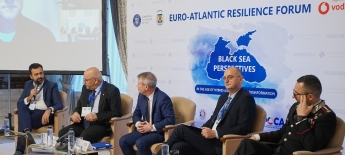 Euro-Atlantic Resilience Forum 2022
Euro-Atlantic Resilience Forum 2022Euro-Atlantic Resilience Forum 2022: Black Sea Perspectives in the Age of Hybrid Aggression and Disinformation
» read more International GIS Day Conference
International GIS Day ConferenceOn the occasion of the World Geographic Information Systems (GIS) Day
» read more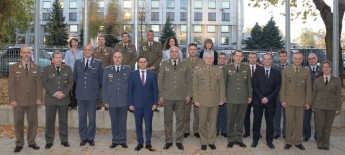 Prolific meeting of the Steering Committee
Prolific meeting of the Steering CommitteeThe tenth meeting of the CMDR COE governing body
» read more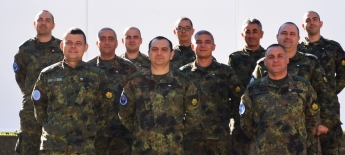 CMDR COE’s contribution to the computer-assisted exercise
CMDR COE’s contribution to the computer-assisted exercise Command Post Exercise (CPX), "SEVEN STARS 22", 03-07 OCT 2022
» read more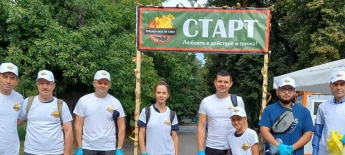 CMDR COE joined the campaign
CMDR COE joined the campaign On the Day of Sofia, the CMDR COE representatives joined the Initiative „Let’s Clean Bulgaria Together”, which unites institutions, non-governmental and business organizations and volunteers in the name of the cause of a cleaner environment.
» read more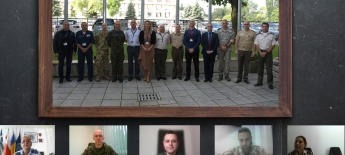 A course for planners development
A course for planners developmentCrisis Response Operation Planners Professional Development Course (12-16 Sep 22)
» read more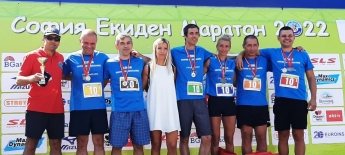 Gained Cup at the 8th Sofia Ekiden (Relay) Marathon
Gained Cup at the 8th Sofia Ekiden (Relay) MarathonThe CMDR COE Team won the cup in the category Governmental Institutions at the 8th Sofia Ekiden (Relay) Marathon on 6 September 2022.
» read more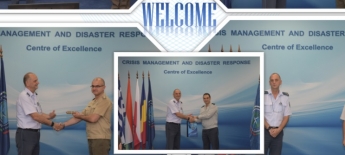 Welcome Newcomers
Welcome Newcomers
» read more
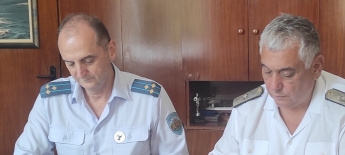 Extension of the Technical Agreement between CMDR COE and the Nikola Vaptsarov Naval Academy
Extension of the Technical Agreement between CMDR COE and the Nikola Vaptsarov Naval AcademyAn Annex to the Tehnical Agreement was signed between the CMDR COE and the Nikola Vaptsarov Naval Academy formalizing the commitment to implement the agreed activities within the next 5 years.
» read more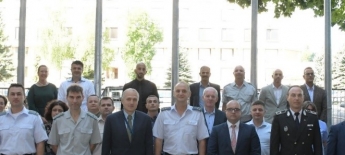 ESDC Press Release on the Disaster Relief in CSDP Context Course
ESDC Press Release on the Disaster Relief in CSDP Context CourseThe European Security and Defence College (ESDC) had the honour of co-organising the course on Disaster Relief in CSDP Context, together with the Crisis Management and Disaster Response Centre of Excellence, the Diplomatic Institute to the Minister of Foreign Affairs of Bulgaria and the Romanian National College of Home Affairs.
» read more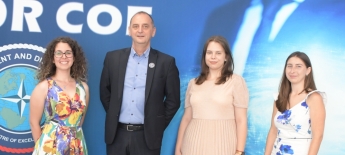 Spring 2022 CMDR COE Interns successfully complete their internship
Spring 2022 CMDR COE Interns successfully complete their internship Interns present their research on CMDR-related topics.
» read more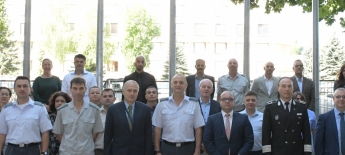 Disaster Relief in CSDP Context Course
Disaster Relief in CSDP Context CourseThe aim of the course is to provide basic knowledge about the impact of man-made, natural and climate driven disasters on the European Security.
» read more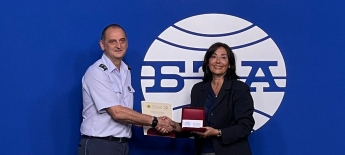 Honorary Award from the Bulgarian Diplomatic Institute
Honorary Award from the Bulgarian Diplomatic Institute CMDR COE Director awarded for contribution
» read more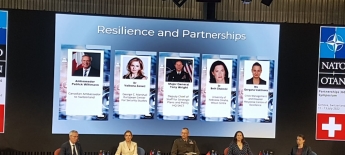 NATO Partnerships 360 Symposium
NATO Partnerships 360 SymposiumCMDR COE Panelist to the NATO Partnerships 360 Symposium.
» read more
